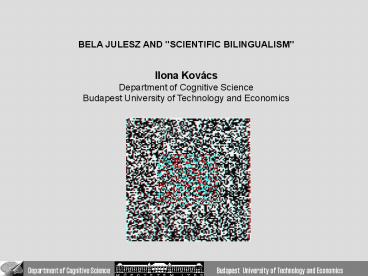1. dia - PowerPoint PPT Presentation
1 / 17
Title:
1. dia
Description:
test of stereopsis in human infants and monkeys ... essential for stereopsis. therefore, figure-ground segmentation, and even recognition precedes stereopsis ... – PowerPoint PPT presentation
Number of Views:56
Avg rating:3.0/5.0
Title: 1. dia
1
BELA JULESZ AND "SCIENTIFIC BILINGUALISM" Ilona
Kovács Department of Cognitive ScienceBudapest
University of Technology and Economics
2
Béla Julesz (1928 -2003)
1950 - 1956 Budapest University of
Technology Dept of Telecommunication
(TÁKI) 1956 - 1989 ATT Bell
Laboratories (Sergei Schelkunoff) 1956 1964
Member, technical staff 1964 1982 Head,
Sensory and Perceptual
Processes Dept 1983 1989 Research Head,
Visual Perception Research
Dept. 1989 2003 Rutgers University, NJ State
of New Jersey Professor of Psychology and
Director, Laboratory of Vision Research
engineer psychologist
3
Visiting professor at MIT several times 1985
1993 continuing visiting professor
Caltech 1982 corresponding member
Goettingen Acad Sci 1983 -1988 Mac Arthur genius
award 1985 Heineken Prize Netherlands
Acad Sci 1987 honorary member Hungarian
Acad Sci 1987 member, Natl Acad Sci, USA 1989
Karl Spencer Leshley Award Am Phyl Soc
Julesz, in front of a computer generated picture
exhibited in 1965 at the Howard Wise gallery, NY
City
4
- random-dot stereoimage technique
- test of stereopsis in human infants and
monkeys - direct access to the mind psychoanatomical
(non-invasive) tracing of information flow in the
visual system - In the top 100 influential publications for
cognitive science
1971, Chicago University Press Second edition in
preparation
5
- random-dot stereoimage technique
- natural magic
- the strength and clarity of a visual stimulus
- first publication 1960, Bell. Labs Technical
Journal
6
Chapter 2 The Creative Process Conjugacy
versus Scientific Bilingualism
1995, MIT Press
7
(No Transcript)
8
- Biritish exponents of natural magic
- Physiology of optics
- 1834, James Elliot
- 1838, Charles Wheatstone landmarks in each
image - David Brewster perspective
9
- The psychologists view in the 50s
- monocular form cues and contours are essential
for stereopsis - therefore, figure-ground segmentation, and even
recognition precedes stereopsis
10
Breaking camouflage in aerial reconnaisance Two
views a stereoscope target jumps out in depth
without monocular form cues!
11
The perfect camouflage Random-dot
stereoimages generated on the IBM 704 (1959) a
clash between two cultures, an association
between two foreign languages (that of a
psychologist and the engineer) in the head of a
bilingual (Julesz, 1986)
12
(No Transcript)
13
Correspondence problem! however, false matches
are not created by the brain
14
??????Very high level??????
Early!!
15
- Hubel and Wiesel 1962
- Barlow, Blakemore and Pettigrew 1967
- Bishop 1969
- Gian Poggio 1984 disparity selective neurons in
V1, V2. V3, V3a
response of a binocular depth cell
16
Development of the ocular dominance columns Most
intensively studied model of environmentally
driven neural plasticity (nature/nurture) At
birth thalamic inputs from the two eyes
to cortex overlap Mature cortex
thalamic inputs segregate (segregation is very
sensitive to visual input) Functional
binocularity in humans 3-4 months
17
although science usually progresses
unconsciously through overlapping fields of
disciplines, more conscoius contributions can be
made if a scientist is willing to learn two
remote disciplines and apply his scientific
bilingualism to the study of brain research.
(Julesz, 1995, p. 20) To play in tune, to
produce uninterrupted lines, to eliminate
scratchy sounds, to guard against uncontrolled
dynamic changes in bow speed, and to avoid
unwritten notes while connecting distant
intervals are not technical demands but musical
ones. The solutions are technical
nevertheless. (Janos Starker, 2004, p. 272)































